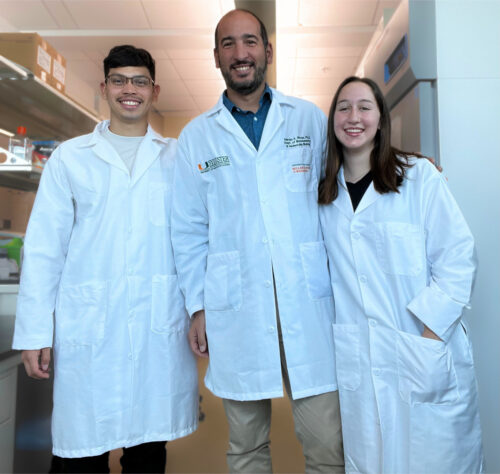June 23, 2023
Share
Cancer research is a rapidly advancing field, greatly benefiting from the use of modern approaches like 3D genomics. By mapping the 3D organization of the genome, researchers can gain valuable insights into how genetic alterations contribute to cancer oncogenesis.
We received many innovative project proposals for our 2023 Cancer Research Grant, making the selection process highly competitive. After careful consideration, the Arima grant committee is thrilled to announce Richard Koche, PhD, of Memorial Sloan Kettering Cancer Center and Martin Rivas, PhD, of the Sylvester Comprehensive Cancer Center as the recipients of this year’s cancer grant! They will each receive a complimentary Arima HiC+ sample prep and library prep kit bundle, enabling them to integrate 3D genomics data into their exciting cancer research projects.
Mapping the 3D chromatin architecture in neuroblastoma
Grant Recipient: Richard Koche, PhD

Richard Koche, Director of Computational Epigenetics and Associate Director of the Center for Epigenetics Research at MSK, will use 3D genomics to map the 3D chromatin architecture in neuroblastoma.
Institution: Memorial Sloan Kettering Cancer Center
Project Title: Mapping 3D genome architecture to decipher the regulatory code and reinsertion potential in extrachromosomal vs linear MYCN-amplified neuroblastoma
Project Overview: In a large subset of cancers, extrachromosomal amplification of DNA (ecDNA) has been identified as an oncogenic driver, including in up to 32% of patient samples in the pediatric solid tumor neuroblastoma. However, the effects of DNA circularization — on both the amplified sequences themselves and their effect on the linear genome — are still largely unknown. Prior studies highlight the potential for trans-contact regulation and also have implications for genome reinsertion events, which precipitate further genome remodeling and tumor evolution.
Using neuroblastoma tumors driven by MYCN amplification in either its circular or linear forms, the Epigenetics Research Innovation Lab proposes to map the 3D chromatin architecture using Hi-C as well as HiChIP with H3K27ac and CTCF to decipher the regulatory code as well as quantify the trans contact landscape with the linear genome. This project will utilize 3D genome assays with three key goals in mind:
- Classify looping structures within circular ecDNA compared with linear HSR amplifications
- Quantify the potential for ecDNA to contact and potentially regulate the non-amplified linear genome
- Understand the implications of these contact points in ecDNA reinsertion events and further genome rearrangements
“After decades of mostly observational, microscopy-based studies of extrachromosomal oncogene amplification, we can now use the power of 3D genomics to better understand how gene regulation and genome structure synergize to drive tumorigenesis and tumor evolution in a class of cancers that have proven incredibly difficult to treat.” – Richard Koche, PhD
Exploring the role of chromosomal architecture during phenotypic changes that enable metastasis
Grant Recipient: Martin Rivas, PhD

The Rivas Lab at the University of Miami will investigate the role of chromosomal architecture during phenotypic changes that lead to cancer dissemination.
Institution: Sylvester Comprehensive Cancer Center, University of Miami
Project Title: Role of chromosomal architecture during phenotypic changes leading to cancer dissemination
Project Overview: Cancer dissemination to secondary sites requires phenotypic changes in primary tumor cells. These changes are purely epigenetic in nature and are dependent on extracellular signals that are sensed by cancer cells. The role of cell signaling inducing epigenetic modifications has been extensively documented. However, the role of chromosomal architecture remains unexplored.
In this project, the Rivas Lab plans to explore the role of chromosomal architecture during those phenotypic changes that enable metastasis in an attempt to learn how to manipulate them and prevent metastatic dissemination.
“Arima Hi-C is the gold standard in chromosome architecture studies; compared to home-brew methods that require multiple and laborious steps, Arima kits for Hi-C provide robust and reproducible data that enable the exploration and discovery of chromosomal architecture features in cancer and immunology.” – Martin Rivas, PhD
Congratulations to these brilliant researchers! All the hard work is still ahead, but we cannot wait to see the discoveries our cancer grant recipients make as they pursue their projects. Learn more about Arima technology and how 3D genomics can serve a critical role in your cancer research.
